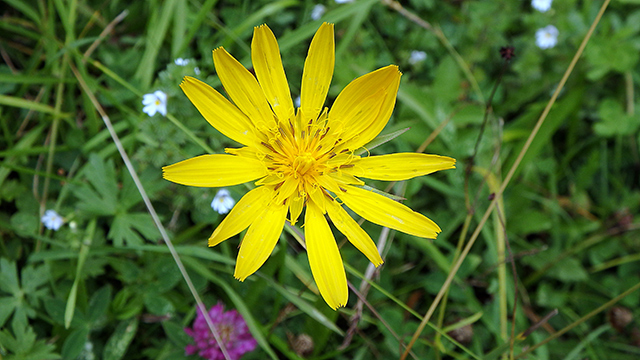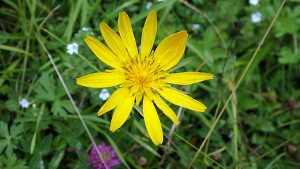
Arnica – sources, health benefits, nutrients, uses and constituents at NaturalPedia.com
Wednesday, August 09, 2017 by Earl Garcia
http://www.naturalpedia.com/arnica-sources-health-benefits-nutrients-uses-and-constituents-at-naturalpedia-com.html

Arnica is a perennial herb that is native to the mountains of Europe and Siberia. The plant, which is also known as “mountain daisy,” is characterized by its yellow-orange blossoms that resemble daisies. However, the herb is more closely related to the sunflower. Arnica comes in many other names including wolf’s bane and mountain tobacco.
List of known nutrients
Like most medicinal herbs, arnica contains powerful natural compounds that treat a host of conditions. An entry on Herbpathy.com lists the nutrients found in arnica, which include:
- Alkaloids
- Apigenin
- Betaine
- Betuletol
- Caffeic Acid
- Carotene
- Choline
- Cholorogenic Acid
- Courmarins
- Cryptoxanthin
- Cynarin
- Eupafolin
- Flavonoids
- Gallic acid
- Hispidulin
- Inulin
- Jaceosidin
- Kaempferol
- Linoleic Acid
- Lutein
- Myricetin
- Palmitic Acid
- Phenolic Acid
- Phytosterols
- Quercetin
- Rutin
- Scopoletin
- Spinacetin
- Tannins
- Terpenes
- Thymol
- Trihydroxy
- Umbelliferone
- Vitamin A
Medicinal uses for arnica
Arnica is best known as a remedy for swollen muscles. The herb contains soothing, anti-inflammatory effects that relieve pain associated with injuries and strains. In fact, arnica is the most commonly used herb among athletes. Aside from this, arnica is also touted for its beneficial effects in alleviating arthritis. Aside from this, the herb is also known for its analgesic properties that effectively relieve topical pain.
The superfood is also commonly used in the treatment of internal bleeding. Compounds found in arnica are known to expedite healing of broken blood vessels in the various layers of the skin. As a result, the herb helps speed up recovery from bruises. Arnica is also a traditional remedy to post-partum bleeding. Aside from this, the herb is also shown to address post surgery conditions. A study published in 2006 notes that taking a homeopathic dilution of arnica helped reduce post-operative swelling in patients undergoing arthroscopy.
In addition, arnica is valued for its beneficial effects on the skin. The herb contains antibacterial, antiseptic, and anti-inflammatory properties, and is commonly used in the treatment of various skin diseases such as skin infections, eczema, itchiness, and open wounds. Other skin conditions treated by arnica include stretchmarks, acne, and sunburn. Likewise, the superfood can also be used as a remedy to vaginitis and vaginal irritation. On the other hand, essential oils from arnica are notably effective in relieving frostbites and chilblains.
Moreover, the plant’s antibacterial and antimicrobial properties help improve the overall oral health. Using arnica mouthwashes is shown to prevent the onset of bacterial infections such as gingivitis and pyorrhea. The herb is also an touted to curb wisdom tooth pain. Aside from this, the superfood is also shown to alleviate feelings of depression and emotional distress. Furthermore, the herb can be used to treat a variety of diseases affecting the circulatory system. The herb is also found to treat influenza, which demonstrates its efficacy in boosting the body’s immune system.
Body systems supported by arnica
Arnica is particularly beneficial to the muscular system. The herb is also helpful in relieving joint pain and promoting the skeletal system’s overall health. In addition, arnica is found to bolster the immune system. Moreover, the herb is known to address various diseases that impact the circulatory, nervous and digestive systems. The herb is also beneficial in maintaining a healthy skin.
Ways to use arnica
Arnica can be used as an infusion to treat aches and pains. The herb can also be processed into tincture and infused oil to address muscle pain, sprains, and bruises. An article posted on the Wellness Mama website provides a step-by-step guide in making these concoctions.
Where to learn more
- Arnica Montana Homeopathic Remedy for Bruises, Trauma and Shock
- Arnica: Powerful Natural Pain Relief
- Live Naturally with Herbs: Healing Properties of Arnica
- If you only choose one remedy for survival and pain relief, grab some Arnica
- How To Make A Pain Relieving Coconut Oil Arnica Salve
Summary
Arnica alleviates muscle strain, arthritis and joint pains, and internal bleeding.
Arnica prevents infections, skin conditions, and depressive symptoms.
Arnica benefits the muscular, skeletal, and circulatory systems.
Arnica supports the digestive, nervous, and immune systems.
Sources include:
Tagged Under: Tags: Arnica






